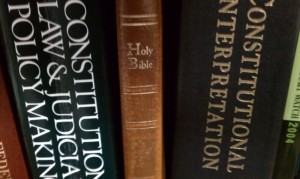 Sometimes we call it “the good book,” but for Christians, the Bible is more than a book, it is THE BOOK. The Bible is the source of truth and the foundation for our lives. We believe it carries not just wisdom, but authority.
Sometimes we call it “the good book,” but for Christians, the Bible is more than a book, it is THE BOOK. The Bible is the source of truth and the foundation for our lives. We believe it carries not just wisdom, but authority.
The Bible, though, is not a blueprint for every aspect of our lives, for it does not address every issue, nor does it examine every contingency. We often struggle to take the grand principles of Scripture and translate them into public life, but, I believe, this is our calling and our obligation.
This issue has popped up recently in the oddest of places–Fox News. Bill O’Reilly started the kerfuffle when he claimed that Christians were losing the argument on gay marriage because they are generally “thumping” their Bibles instead of providing other explanations or rationale for their beliefs. Rush Limbaugh, Laura Ingraham, and Mark Levin have piled onto the train of criticism winding its way toward, and now past, O’Reilly, largely contending he had been dismissive of religion and insulting or condescending toward Christians.
Will Saletan, at Slate, has a round-up of the affair, and generally agrees with O’Reilly, though he makes an additional point. He critiques conservatives as being overly reliant on textual authority:
Reliance on sheer textual authority—not just the Bible, but the Constitution and the Declaration of Independence—is a common problem on the right. The moral power of the Bible, the Constitution, and the Declaration arises not from their proclaimed divinity but from the cogency, integrity, and resonance of their principles.
Surely in many ways, Saletan is correct, though he obscures what ought to be important distinctions. Conservatives do tend to venerate authority rooted in tradition. Textual authority is appealing because of its clarity, especially as compared to cultural norms or vague histories that are often ambiguous once we wade into the details. Christians, indeed, limit their impact when they pretend that an appeal to authority is effective within our current milieu.
Saletan goes on to argue that conservatives need champions of publicly accessible and persuasive arguments that are far more likely to succeed. He points to Ross Douthat, Noah Millman, and Ramesh Ponnuru as examples. I know that Ponnuru and Douthat are proclaimed Christians, though I am unaware of Millman’s religious leanings (my lack of awareness is largely due to my general ignorance of Millman). Saletan implies, it seems, that for Christians to succeed in the public square they must use reason and evidence as opposed to authoritative appeals.
There is so much that could be written, but let me limit myself to a couple of key points. Saletan’s critiques are common. Rawls essentially defines the public square in these terms and demands that accessible argumentation is required for entry into that space. In essence, we should enter the public square apart from our most deeply held, authoritatively based beliefs. For the purposes of justice, infused by liberal democracy, this is necessitated.
While Rawls is arguing this from a normative perspective, Saletan seems to be using this premise as a point of advice for effectiveness. I am, as always, deeply touched that Saletan seems to care about the nature of our effectiveness in the public square. In other words, I am not sure we, as believers, should care, a whit, about our effectiveness as perceived by external critics. If our goal is to influence the public square, surely effectiveness becomes a meaningful measurement, though some might argue that effectiveness is secondary to our role as Witness to God’s truth, regardless of the consequences. There may be a disagreement, then, over the ends of public engagement and these varying ends might imply varying means. Surely reason alone (although I think it is a stretch to argue that is possible or that our public square responds well to reason–see any recent electoral contest for evidence) may be a more appropriate method for rational persuasion, but reason, apart from the truth of God’s word, is merely reason and cannot provide the sort of Witness often demanded.
The point of democracy is indeed to persuade your fellow citizens through whatever means may be at hand. If appeals to sacred authorities are effective, we have no compelling reason to adjust our methodology. Lincoln’s Gettysburg Address is largely an appeal to emotion, grounded in the loss of brave soldiers, and an appeal to the Founding Fathers and their conception of our government. Regardless of the extent to which it might, or might not, qualify, Lincoln’s small speech was intensely effective and persuasive. It is at least worth noting that appeals to our founding documents are deemed as insufficient to many. This, in itself, is a testimony to our declining civic commonality, though that is a separate issue.
Of course, Saletan’s own admonition is indeed an appeal to an authority that defines the public square in particular terms. It is not born out of sheer reason, but out of a set of presuppositions about how a democracy ought to function. Beyond this, liberals and progressives have their own sets of authorities to which they appeal as it suits them. Roosevelt’s Second Bill of Rights or Four Freedoms are endlessly on the lips and buried deep in the hearts of progressives. Roe v. Wade is to the radical, or not so radical, feminist as much sacred writ as is the Sermon on the Mount to the Christian. While not even Justice Ginsburg believes Roe spilled from Justice Blackmun’s divinely inspired pen, neither was it merely reasonable argumentation divorced from deeply held beliefs, and nor is it treated as such by its advocates.
 Bert Wheeler
Bert Wheeler
 Jeff Haymond
Jeff Haymond
 Marc Clauson
Marc Clauson
 Mark Caleb Smith
Mark Caleb Smith
 Tom Mach
Tom Mach